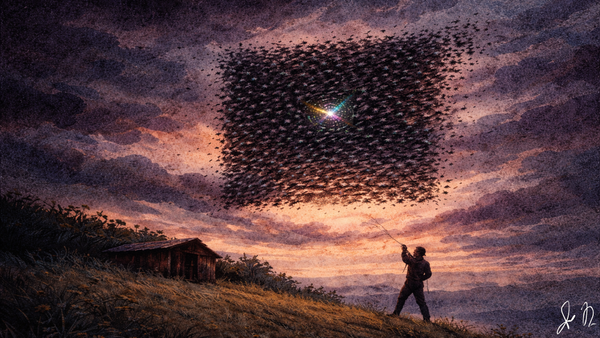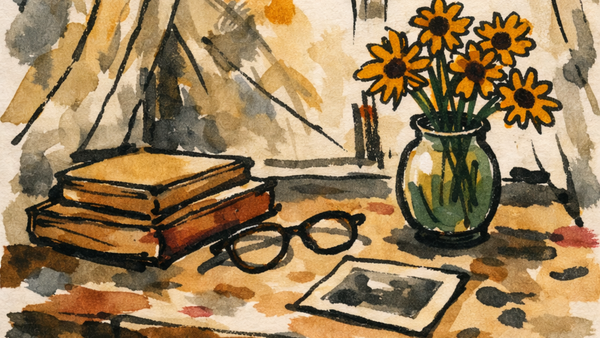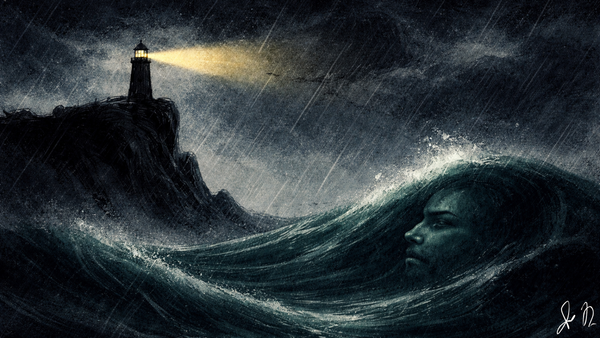The Ex Files
Her ex is getting married. Her other ex is the maid of honor. This is fine.

There’s a special circle in hell for people who RSVP “yes” to their ex’s wedding, and I’m pretty sure it comes with monogrammed robes and unlimited rosé.
The invitation arrives on a Wednesday, a day otherwise famous in my apartment for leftover pasta and pretending my houseplants are thriving. It’s a thick, creamy envelope, and when I open the card, pressed leaves scatter onto my welcome mat like confetti that overshot its moment.
You are joyfully invited to celebrate the union of Eliza Hart and Thomas “Tom” Brennan.
My stomach does a whimsical loop and lands somewhere near my ankles. Below the names, in smaller font, Eliza’s handwriting snakes in: June, it would mean the world to have you as a bridesmaid. You’ve been such an important part of my life. XO, E.
I have three immediate thoughts in quick succession:
- She spelled bridesmaid correctly, which for her is tremendous growth
- “Important part of my life” is the kind of phrase that should only exist on my tombstone.
- I’m absolutely not going. Obviously. Obviously.
I prop the invitation on my bookshelf, between a salt lamp and an unfinished fern watercolor. I go about my Wednesday business, which means I spend twelve minutes microwaving spaghetti then Googling “polite ways to decline bridal party” and “fainting couches.” Then I text my best friend Nora, who replies with six skull emojis and you’re not considering it, right???
I am not. I am not considering it for three days, during which I turn the card to face the wall like a small misbehaving child. On the fourth day, I turn it back. On the fifth day, my brain does something truly unhinged and drafts an acceptance message that includes a lot of exclamation points and the sentence, I’d be honored, Eliza.
Then I hit send, throw my phone onto the couch, and slide to the kitchen floor, where my cat, Simone, blinks as if I’ve finally done something interesting.
“There,” I tell Simone. “I’ve chosen growth. Aren’t you proud?”
Simone yawns, revealing a tongue the color of a Valentine candy heart.
I could give you a list of reasons for why I have agreed to doing something so transparently foolish as attending the wedding of a person I once thought would be my wife. Closure. Curiosity. Proof that I’m an adult woman who can attend a pastel event without crying into a napkin. The truth is smaller and meaner. I want to see her. Not to stop anything—this isn’t a movie—but to make sure the memory of us hasn’t been replaced by a version that flatters one person and flattens the other. To make sure I’m real in the story she tells herself at night.
⸻
The venue is a lakeside inn with weathered boards and a dock that creaks like a grandparent. I arrive on a Friday in June (the month, not me the person), a tote bag on my shoulder and a garment bag dragging dust bunnies through the lobby. The whole place smells like lemon oil slathered on soft bread. There are white hydrangeas in ceramic pitchers, and a chalkboard sign reading WELCOME HART–BRENNAN GUESTS in handwriting that makes me want to mind my posture.
A woman behind the counter gives me my key and a map of “the grounds,” which turns out to be a lawn with like two hedges. As I trek to my cabin, I pass clusters of people in sundresses and linen shirts who are hugging like they’ve each won a small lottery. The sky is theatrical blue. The lake is a mirror.
There’s a bridesmaids’ brunch on the deck. I am ten minutes late because I spend nine minutes pretending not to care and one minute choosing which sandal draws the least attention to my toes. When I arrive, Eliza is already there, cheeks flushed, hand woven through the hand of a man who is, unfortunately, adorable.
He’s tall in a weirdly polite way. Big shoulders, soft eyes, smile that crinkles so much he’s clearly been smiling like this for a long time and sees no reason to stop now. The kind of guy who would teach middle-school science and bring extra granola bars for the kids who forgot their lunch. If I’d been hoping for a smirk or a cologne that smells like death, the universe has denied me that scene partner.
“June!” Eliza says, standing so fast her chair does a squeak. She looks like summer itself found a yellow dress, hair tucked back with a clip that glints when she moves. She hugs me hard enough to bruise a tender part of my sternum, then pulls back and does the face—a smile with careful eyes. “I’m so happy you’re here.”
“Me too.” The lie tastes like a shot. “Congratulations.”
Tom extends his hand. “We’ve heard so many stories about you,” he says, and the we lands on my shoulder like a bird that might peck or sing, I can’t tell which.
“All true, but context is for cowards,” I say, and he laughs, warm and uncomplicated.
The bridesmaids are clustered around the table, a still life of glass pitchers and quiche. There are two cousins, one childhood friend (madly in love with her own fiancé and the concept of Etsy), and a woman in a crisp black sundress with a posture that says she is both prepared for anything and unimpressed by most things. She’s talking to the florist about peonies with the focus of a surgeon. When she glances up, my heart does a thing I learn in yoga to call “surprise” but which other people call panic.
Riley.
There are a few people in your life who can reroute your bloodstream just by existing in your periphery. Riley is one for me. We dated for four months in our early twenties, which in queer time is somewhere between “we went on two dates” and “we almost bought a rug together.” She was a grad student then, bartending at night, and the day we broke up she cried in a quiet, angry way that haunted my hairline for a year. When I think of her, I think of the smell of lime and the feel of being seen as a person with deflective instincts—and somehow being loved anyway.
She walks toward me with a glass of ice water and her eyebrows doing that shape they do: amused, assessing, a little skeptical. She’s still absurdly beautiful, all angles softened by a mouth that has never believed in keeping quiet. The black dress fits like it was made by someone who understands both the concept of integrity and the existence of hips.
“June,” she says, annunciating it gently, like we’re remembering how to use each other’s names. “You actually…showed up.”
“Hi,” I say, because my brain is currently a static channel with a single commercial about Riley’s deodorant.
Side note. I actually met Eliza because of Riley. They’ve been best friends since middle school. And I’m the super fun chill person who has slept with both of them and remained friends with only one of them. Go figure.
“Riley!” Eliza sings, tugging us into a three-person constellation that puts me in orbit around the past and the present at the same time. “Did I tell you June is a bridesmaid? Isn’t that perfect? You two always got along.”
Riley’s mouth does a very small thing that in Riley-speak translates to: this is a maze with only one exit and it’s on fire. “So perfect,” she says. Then to me, sotto voce: “You seriously RSVP’D?”
“I did my civic duty,” I say. “It felt rude not to.”
We take our seats, and the brunch swells around us as all wedding activities do, with the buoyant insistence of people cosplaying as their best selves. Eliza is incandescent. Tom alternates between squeezing her hand and refilling everyone’s water like hydration is his moral responsibility. I’m so busy not staring at Riley that I almost miss the moment Eliza squeezes my knee under the table and whispers, “Thank you for being here, really.”
“Of course,” I say, and realize—hard, like a truth in the face—that I want this to be good for her. Not performatively good. Not “I hope this falls apart and I get to be the hero” good. The sort of good where someone you loved gets what they want and you’re small and silly enough to be happy for them anyway.
After brunch, there’s a flurry of tasks. Gift bags to assemble, ribbon to curl, emergency stain remover to locate because someone’s cousin has discovered the perils of red sangria. The group chat lights up: BRIDESMAIDS 💫: calling it now: June will elope with the cake / bring scissors to room 3—STAT / who has bobby pins?? asking for eight different people.
Every time my phone buzzes, I feel the ridiculous fizz of being included and the weird ache of a reunion that might be about more than bobby pins. Riley hovers near logistics like a benevolent, sarcastic moth. She’s good at this, the orchestrating, the calm voice that makes everyone else’s frantic voices settle.
I corner her near the bow-making station, which is a real place and not a metaphor.
“So,” I say, twirling a length of ribbon like nunchucks. “Maid of honor. That’s a big job.”
She lifts a shoulder. “Someone had to know the difference between a boutonniere and a corsage.”
“You always did love a well-labeled system.”
“You always did love pretending you were above having feelings.”
“Wow.” I pretend to be offended, but I can feel the smile tugging at my mouth. “Four months of dating and you think you know me.”
“June,” she says, rolling her eyes in a way that suggests she has a slide deck titled Things I Know About You, with subheadings and an appendix.
We fall into a rhythm so easily it makes me nervous. It’s a dance choreographed by memory: I hand her tape, she hands me sanity. We cross a hallway at the same time and pause because our bodies remember exactly how much space we used to leave for each other. It’s fine. I’m fine.
That night there’s a welcome party on the lawn with fairy lights and a Spotify playlist someone should get a refund for. I wear a dress that makes my collarbone look halfway presentable, and Riley shows up in a navy jumpsuit that causes two different aunts to whisper the word sharp without a hint of irony.
Eliza drifts in a bubble of attention, stopping every few steps to accept compliments. Tom never strays more than a breath away. They look happy—the real kind, the soft animal kind that doesn’t care if this photo ends up on a mantle or inside a shoebox. I keep waiting to feel the old twist in my gut, the one labeled but she loved me better, and it doesn’t come. What arrives instead is something quieter. Relief, maybe, or the shape of something I’ve been carrying that I can finally set down.
Riley finds me at the edge of the dance floor. “So,” she says, offering me a plastic flute of champagne. “Team meeting?”
I take the glass. “What’s our agenda, captain?”
She tilts her head toward the bride and groom, who are currently being taught a line dance by a very enthusiastic twelve-year-old in suspenders. “Make sure Eliza means it,” Riley says.
“Means…what exactly?”
Riley gives me another one of her signature looks. “The French Revolution, what else, June? That she really wants to be with this guy.”
I glance at her, almost sideways. “Hold on, we both know Eliza’s bi, so what are you really implying?”
“I’m not implying anything untoward,” Riley snaps back, eyes still on the bride. “Just that I’ve known June since we were 12. She’s only dated four guys since then, two of which before we even had driver’s licenses. The other two guys were such a catastrophe, I was honestly convinced she was going to swear off men for the rest of her life.”
It’s a struggle not to laugh. “Listen, sweetie. As the person who almost made her swear off women for the rest of her life, I think you’re overthinking this.”
Riley puts her hand to her face as if to relieve a headache. “I just…I just want to make sure we’re not letting her make a mistake because we both know she’s better at charming people than choosing them.”
The way she says we makes something traitorous in me sit up straight. “So, what, we do a bisexual investigation of our own ex?”
I expect Riley to dismiss what is clearly a joke. Instead, Riley stares on ahead.
“Riley…”
“We just ask a few questions. Get Eliza to open up a bit more about how she really feels. You know she barely told me about Tom before they got engaged? I only met him like once when they were dating. I haven’t had a chance to figure him out yet. To figure ‘them’ out.”
“Are you actually asking me to do a scheme with you at a wedding?”
“June, look—”
“Oh, I’m not complaining,” I say, cutting her off. “That sounds like the perfect way to make this weekend a thousand percent more bearable. I’m in.”
Riley takes a deep sigh I have trouble interpreting. “Thanks.” She glances at me. “This is for Eliza’s sake, though, not ours.”
“Right. And if she does ‘mean’ it?” I ask.
“Then we smile and dominate the dance floor. Obviously.”
It’s ridiculous. The exact right amount of ridiculous for Riley. I clink my glass against hers. “Operation Proof of Bisexuality,” I say. “Unofficial. Nonbinding.”
“Nonbinding,” she agrees, her mouth curving. “We’ll just observe and collect data. No interventions. This is not a break-up the wedding scenario.”
“No, no,” I say firmly. “Tempting as that is.”
We watch them. Not in a creepy way, in a “we’re very good at loving this person platonically and we want the best for her” way. Tom has a laugh that lifts people a few inches taller without asking. Eliza keeps reaching for him in the casual, habitual way of people who have practiced being gentle. At one point Tom whispers something to her, and she leans back, rolls her eyes, and kisses his nose. I have to look away because it feels indecent.
Riley bumps my shoulder. “Okay,” she says. “He’s a teddy bear.”
“You say that like it’s a flaw.”
“I say it like I now have to admit I like him.”
“Rough night for your brand.”
Her smile softens. “Rough night for yours?”
“Oddly, no,” I say. “Weirdly…good. Which, yes, is off-brand for me.”
She watches me for a beat too long, like she’s measuring my face with an invisible ruler. “You always did know how to surprise me,” she says. “Just not always in the fun ways.”
It’s the closest either of us has gotten to saying I missed you, and my body processes it like a sudden weather change.
“Want to take a walk?” I ask. “Or we can keep doing amateur surveillance. You call it.”
She glances at the dance floor, then at me. “Walk,” she says. “Data suggests fresh air increases emotional stupid.”
“Sold.”
We follow the path down to the dock. The night is warm enough to sleep inside my hair. The water has just the faintest tint of cucumber. We sit with our legs dangling and pass the champagne like teenagers with better glassware.
“I thought you hated me,” I say, because the silence is asking for something true.
Riley huffs a laugh without humor. “I thought I did.”
“Why didn’t you?”
She picks at a splinter in the dock, then lets her hands go still. “Because hating you never felt as satisfying as I wanted it to. And because most of what I hated was the part of you that was really scared.”
“I was,” I say. “I was scared enough to act like I wasn’t.”
“Oh, I remember.” She nudges my knee with hers. “I’m not looking for an apology.”
“Thank god,” I say. “What are you looking for?”
Her smile is small and unfair. “Evidence that you’re different now. Or that I am.”
“I brought a laminated chart of my self-growth,” I say, and she laughs, real this time, tilting her head back like the moon might catch it.
The night is gentle around us, and our hands are a careful two inches apart.
We walk back slow, and on the lawn Eliza catches my eye and offers her simplest, most perfect smile. The one that says she genuinely loves me for all of me. It occurs to me that she might have invited both of us not because she’s careless but because she’s surprisingly brave. That she trusts us to be who she remembers we can be. And that we won’t…scheme.
Oops.
⸻
The morning of the wedding the sky is an obedient blue and the humidity is a level of intimate I don’t remember consenting to. The bridesmaids’ room looks like a flower shop befriended a Sephora. There are garment bags, makeup palettes, a loose galaxy of bobby pins. The group chat pings with updates: someone bring coffee / found the vow book / don’t tell Eliza but i lost my bra and now i’m free and powerful.
Riley is surgically calm. She moves through the room with executive efficiency, delegating tasks and soothing egos like she’s being paid per the crisis. She hands me a little velvet ring box and says, “Guard this with your life,” which is how I end up being the person responsible for the groom’s ring and would you like to hear my heart’s opinion about that? My heart thinks this is an excellent time to relocate to a farm upstate where it can live among hardy goats.
I take my guarding very seriously. I put the ring box in my pocket, then in my bra, then back in my pocket because the bra feels like hubris. I practice my “I am calm” face, which unfortunately looks like I’m trying not to sneeze. Eliza laughs, leaning into me.
“I love you,” she says, urgent. “You know that, right?”
“I do,” I say, and the wedding humor of it makes her snort, which allows her to breathe.
“Am I doing the right thing?” she whispers, because of course she asks me, the person who will tell her the truth even when it is the last thing I want to do.
“Yup,” I say, and it rises up from somewhere I’ve only ever trusted on airplanes. “But only because you’re choosing it. Not because it’s easy. And because you don’t look at him like he’s changing you. You look at him like he sees you the way you want to be seen.”
Her eyes get glassy. “God, you’re good at words.”
“Occupational hazard,” I say. “Now, please marry the teddy bear so I can stop sweating about this ring.”
The ceremony happens under an arbor that Eliza’s cousins built that morning, which seems like a liability and turns out to be perfect. The officiant is a friend who keeps almost crying and then pretending he’s not, which only makes everyone else wince. When Eliza walks down the aisle, half the row behind me makes a sound usually reserved for puppies tumbling.
Tom looks at her like people look at a view that rearranges their sense of smallness. He stumbles over his vows, and it’s adorable, and when it’s Eliza’s turn, she squeezes both his hands and says, “I never thought home would be a person, and then you started leaving snacks in my car.”
Everyone laughs. Everyone sobs. The ring exchange arrives and I, heroine, produce the velvet box like it is the Holy Grail. The ring glints. The lake pretends not to stare. They say I do, and we clap, and I have the weird, dizzy sensation of standing in the exact center of something that, for once, does not need me to push it one way or the other.
At the reception, I do my due diligence as a former girlfriend and spend five aching minutes with the groom. We're at the dessert table since it's neutral territory.
“Hello,” I say. “Nice tux.”
“I know right?” he says, sheepish. “I mean—thanks. Officially. Eliza talks about you like you’re her guru or something.”
I have to swallow a small, explosive sob and replace it with a manageable smile. “Taught her everything she knows,” I say. “Except how to be with a dude. That’s all her.”
He chuckles. “I like that you and Riley are here,” he says, surprising me. “Feels like we’re making a real circle around her, you know? Not just pretending old things didn’t happen.”
I stare at his face, at the open sincerity that would be corny on anyone else. He means it. He means every pixel of it. I want to hate him for being easy to like and discover I don’t have it in me.
“Yeah, well, take care of her and all that,” I say, which is what feral exes say in movies, but Tom, sweet Tom, nods like it’s an assignment he can ace.
“I will,” he says. “And she’ll take care of me. That’s the point, right?”
“Right,” I say, and feel something let go inside me, gentle as a curtain falling.
I find Riley near the bar, accepting a whiskey like she’s 18. She’s got that post-crisis glow that only very capable people get, that soft relief of a job well and truly done.
“You cried,” I accuse.
“Please,” she says. “I hydrated. With eyeballs.”
We stand together and watch Eliza and Tom’s first dance, the too-slow sway that says this is not for the photograph but for the secret conversation happening between their breaths. Over the DJ’s shoulder, the lake is shading into gold. The fairy lights snap on like stars feeling competitive.
“Mission report?” I ask.
Riley nudges me with her shoulder. “Subject displays clear affection, observable compatibility, impressive snack-forward romance.”
“Conclusion?”
“Conclusion: we’re idiots,” she says, smiling into her glass, “for thinking otherwise.”
I exhale. “Eh, it was mostly you,” I say. “I had that guy clocked. Sure you’re not bi?”
She turns to me, her signature look returning with a new power to melt steel beams. Then it fades into a temperature I almost forgot. Warm enough to melt something I forgot was frozen; steady enough to make me feel like I could leave it.
“June,” she says, and my name in her mouth is a bridge between two countries. “Do you want to dance?”
“I’m terrible at it.”
“I know,” she says. “That’s why you need me.”
We step into the spill of light. The song is something vintage people love at weddings, full of promises and brass. Riley’s hand finds my waist like it hasn’t forgotten it; mine finds her shoulder, and we laugh, because our bodies still fit in this joke. We sway in our own ugly rhythm, and it does not matter that my heel keeps catching in the grass, or that a small child runs between us with the single-mindedness of youth.
“You left then,” she says softly, after a minute. “At the worst possible moment.”
“I did,” I say. I’ve decided to be the version of myself with periods, not ellipses. “Sorry. I don’t have a good excuse.”
“Can you try one?”
I crinkle my nose. “Guess I owe you that…right…so maybe it’s…I thought the only way to keep myself sane was to keep everything else uncertain. I was wrong.”
She nods, absorbing it like a person collecting taxes.
“And you,” I add, risking it, “you asked me to be more than that, but you were also ready to run if I did.”
Her smile tilts, equal parts rue and pride. “I was,” she says. “I was scared of how much I wanted you to want me.”
“Do you want me to want you now?”
A lightning strike of a question, I know. One that can only exist because I said it without thinking.
She takes a slow breath. The lights catch on the pale tiny scar near her chin, the one she got from a falling glass in a bar on Valentine’s Day the year we thought we could make a cake with no recipe. “I want to cook you dinner that isn’t twelve garnishes and a single scallop.”
“Hm. Well, I want to wash your cutting boards wrong so you can correct me.”
“Hot,” she says. “Extremely.”
We’re both smiling now, ridiculous and sober under a sky that has the good manners to glow. I lean in, cautious, and she meets me halfway, more certain. The kiss is a short one, a promise with good grammar. We pull apart and everything else happens in the slowest of motions.
Eliza smears cake on Tom’s nose and his mother pretends to be scandalized. Riley clinks a glass and gives a toast that has three masterpiece jokes and two truths and one sentence that makes half the tent inhale. She thanks everyone for showing up as their best selves and, even more, for sticking around when their worst selves make an appearance. She looks at me on that last line and does not wink, which has to take amazing restraint.
By the time the band plays the last song, my feet ache and my hair is listing to the left. The lawn is a battlefield of abandoned heels. There’s a half-eaten plate of mini quiches on our table, and someone’s tie has become a headband. Eliza and I find each other near the exit, where the sparklers are being distributed by a woman with the eyes of a safety PSA.
“Thank you,” she says, pulling me into a hug. “For showing up. For… all of it.”
“You did the brave thing,” I say into her hair. “You married a man.”
She pulls back and presses her forehead to mine for a second, our old habit. Her eyes are wet. “He knows me,” she says, simple as a fact.
“I can tell,” I say. “It’s nice to see.”
We join the tunnel of sparklers, the night bright with small pretend stars. Tom and Eliza run through to a car with a sign that says JUST MARRIED in handwriting that is absolutely Riley’s. They kiss like a punctuation mark for the night itself, then drive away to a chorus of cheers and one unhinged scream from cousin Lily.
The lawn empties slowly. The band packs up. The lake is a dark audience of one. I sit on a folding chair, toes bare, dress rumpled in a way I’ve decided to call intentional. Riley appears with two paper cups of champagne and the smug face of someone who successfully returned a deposit on a rented cake stand.
“Come on,” she says. “Victory lap.”
We walk to the dock. The boards know us now. The inn lights throw long gold ladders across the water. I think of all the small, stupid ways I could ruin this with a joke, and I choose not to. Sometimes growth is just the absence of a reflex.
We sit. We share the lukewarm champagne. We make a list—because we are who we are—of things we want to try in the sober light of our regular lives:
- Brunch somewhere unpretentious where the coffee is good and the eggs are worse.
- A movie we can’t agree on, watched anyway.
- A walk that is less scenic than this and more honest.
- A kiss without an audience.
- A day where we tell each other the boring parts on purpose.
“Ambitious,” she says.
“Especially the first one,” I say. “Have you ever even heard of an unpretentious brunch spot?”
On the walk back, I swing my shoes in my hand. Riley carries the empty cups. She takes my free hand near the path, casual as a habit you’re delighted to relearn. Our hands fit in that old, new way, and we walk between the last of the fairy lights and the first of the dark, two idiots with a plan.
Author's Note:
This isn't exactly the first time I've dabbled in a story that inhabits what I love most about Emily Henry's rom-com novels, albeit compressed into short story form and mixed with themes about queer identity. Still, I really wanted to infuse The Ex Files with this sense of "mature" love that tackles the complex geometry of relationships past and present. Plus, who doesn't love this setup as soon as you hear it? I'm sure you can easily imagine the novel version of this, where "Operation Proof of Bisexuality" is an entire three-act engine of hijinks and mayhem.
First, let's talk about June. I gave her a pretty distinctive voice I hope you picked up on. She's self-deprecating, witty, and emotionally intelligent while pretending not to be. In other words, her humor serves as both shield and revelation, a perfect foil to the sturdier but similarly world-weary Riley. In fact, I had it in my head at first that Riley sort of harbored a secret crush on Eliza when they were younger, which could still very well be true...but I realized it was more interesting to let that be unspoken.
The real effort was to try and deftly handle the complexity of queer women's relationships. How exes can remain in each other's orbits for years, the specific intimacy of having dated the same person, and the mature recognition that love can take different forms. The triangle between June, Riley, and Eliza isn't supposed to feel melodramatic or competitive. Instead, there's a genuine care between all three women hopefully feels authentic to queer community dynamics.
Even Tom. Ah, Tom...Tom could easily have been a cardboard cutout, but I wanted him to have some dimensionality. He's secure enough to want his wife's exes present, understanding that they're part of what made her who she is. His line about "making a real circle around her" shows emotional sophistication, I think.
Speaking of, I think I just have a preference for romantic comedies that prioritize emotional honesty without sentimentality, or at least too much of it. And for rom-coms with queer joy that isn't a coming-out story or a tragedy. It's just about queer people living full, complicated lives. Where a list of modest ambitions like finding an unpretentious brunch spot can be more romantic than any grand gesture like chasing someone down at an airport. And to that end, you might've expected drama at the ex's wedding, but instead we get maturity and growth instead. Revolutionary!
Overall, I just wanted to write a story that treats its characters with respect and intentionality that allows them to be funny, flawed, and ultimately kind to each other. Happy endings don't erase happy beginnings, right? And growing up, then, means growing back toward people you once grew away from.
Jon Negroni is a Puerto Rican author based in the San Francisco Bay Area. He’s published two books, as well as short stories for IHRAM Press, The Fairy Tale Magazine, and more.
Support Cetera
Paid members get exclusive perks like bonus stories, the ability to comment, and more. Plus you'd be helping us keep the bills paid. You can check out the subscription tiers below, or you can leave a one-time tip if that works better for you.





